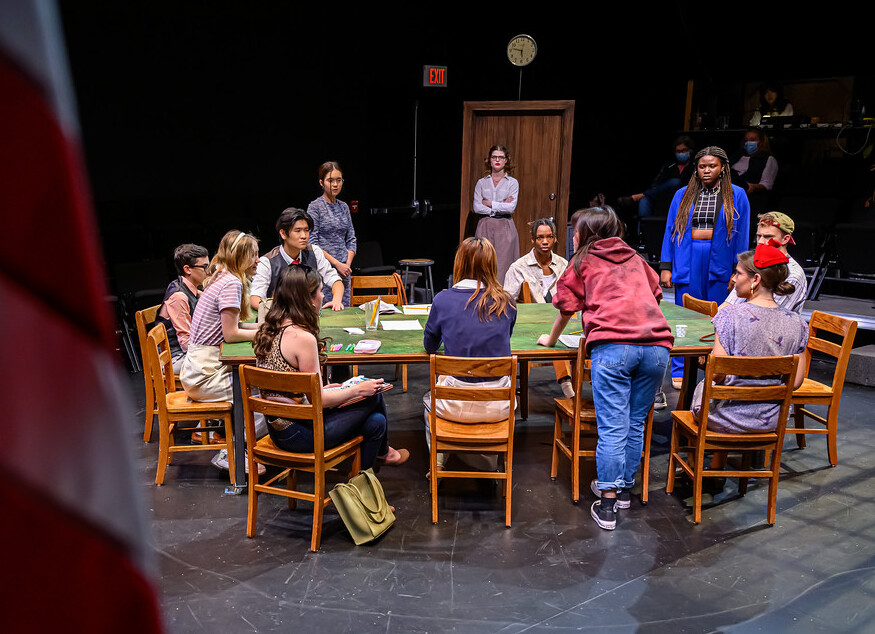The Scales of Justice: Groton’s 12 Angry Jurors
Courtesy of Afrika Gaye 24′
12 Angry Jurors was written seventy years ago, yet it remains substantially relevant in today’s day and age. At face value, the plot seems relatively straightforward: one juror has doubts that the boy on trial is guilty and convinces the other jurors by exposing holes in the prosecution’s case. However, the play communicates a deeper message centered around the role of racial and socioeconomic dynamics in our justice system.
When asked about what the play meant to her, Ms. Sales replied that it represents the continuous “grappling with the workings of our justice system.” Although the original production of 12 Angry Jurors cast only Caucasian males, Groton’s take on the play boasted a diverse and inclusive cast. Ms. Sales noted that she “didn’t go by identity conscious casting,” which, in a nutshell, meant that race wasn’t a factor at all in casting.
Despite changes in the play’s cast composition, actors were very conscious of the implications of the language in the play. As a member of 12 Angry Jurors’ backstage crew, throughout the development of the play, I observed how each actor grew through the lines that are challenging—lines that are often contrary to the actor’s belief systems and push them out of their comfort zone. During a rehearsal, Ms. Sales told us that the best played characters are the exact opposite of the actor who plays them. Apart from the inherent value of acting, one of the greatest gifts that these actors took away from the play was being pushed out of their comfort zones through lines, discussions, and themes.
Racial prejudice was a key component of the play’s plot. The boy on trial is of African American descent. In the play, Juror 10—a main proponent for the guilty verdict played by Jenny Polynice ’25—exclaims that, “They [the boy’s racial group] talk different, they act different … they don’t value life like we do.” Since Juror 10 is one of the three main advocates for the guilty vote, Juror 10’s racially prejudiced nature changes the play’s deeper meaning from one of doubt to one of a justice system broken by bias.
12 Angry Jurors touches upon many important subjects in our lives: race, socioeconomic status, personal motives, and bias. A line from Juror 11, played by Jessica Lee ’24, sums up the meaning of the play. Juror 11 notes the value of the legal process: “We’re notified to come down and determine the fate of someone we don’t know.” The American justice system is, as Juror 8 (Abigail Hunnewell ’23) says, a “safeguard” for democracy – one that has been put to the test and needs improvement.
Most courtrooms have a statue of “Lady Justice.” She is blindfolded and holds a scale. Prejudice and personal bias in the courtroom are a major failing of the justice system. There have been far too many cases where Lady Justice isn’t blindfolded and her scale is skewed. Although 12 Angry Jurors acknowledges instances of bias clouding justice as an unfortunate reality, it encourages the audience to strive to uphold justice and to remove bias from the courtroom.


